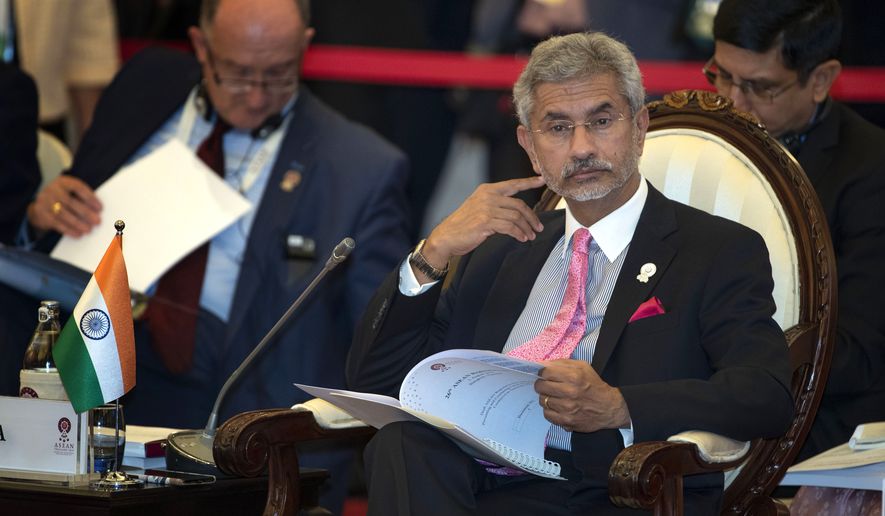OPINION:
NEW DELHI — Indian Prime Minister Narendra Modi, Chinese President Xi Jinping, Russian President Vladimir Putin and President Trump operate quite distinctly, both ideologically and stylistically.
For instance, Mr. Modi is an ardent Hindu nationalist who projects the image of an ascetic unconcerned or even disdainful of worldly possessions. Mr. Trump, on the other hand, is secular and acquisitive.
Mr. Xi, meanwhile, has expanded China’s role overseas, investing in infrastructure projects across the world, while Mr. Trump has tried to wind down America’s presence around much the globe, particularly where little direct U.S. national interest is at stake.
And then there’s Mr. Putin, who struts on camera on horseback or shirtless (or both), while one suspects if a photo of Mr. Trump bare-chested were to leak, he would probably sue to suppress its circulation. One is a judo master; the other golfs.
Because of their varying priorities, all four leaders have locked horns with one another on multiple occasions.
Yet for their myriad differences, the Indian, Chinese, Russian and American leaders are in harmony on one thing: Each believes strongly in national sovereignty. The idea is that what goes on in within a country’s borders is solely the concern of that country and its leaders, not international organizations or foreign governments.
National sovereignty, codified in the Treaty of Westphalia dating to 1646, has ebbed and flowed over the centuries. For obvious reasons, after World War II, there was a turn against it. Adolf Hitler’s reign, which began with his repression of people “only” within Germany’s borders, gave the lie to the notion that totalitarianism and genocide are containable. Regimes that are aggressive inwardly toward their own people tend to eventually become aggressive outwardly toward others.
But lately, because of overstepping by anti-democratic, international institutions — the European Union, for example — those championing a return to the principles of national sovereignty are on the ascent. It’s not just the leaders of the big countries listed above. The heads of countries as varied as Brazil, Hungary, Israel and the Philippines now preach the doctrine of “don’t bother us, we won’t bother you.” China has long operated by this principle, which it calls noninterference.
This week, Indian External Affairs Minister Subrahmanyam Jaishankar was in Beijing. The visit by India’s equivalent to secretary of state came at a tricky time. India earlier this month stripped the disputed region of Kashmir, which is also claimed by archrival Pakistan, of its special constitutional status. (Parts of Kashmir are already controlled by Pakistan.) Indian-administered Kashmir will no longer enjoy special autonomy.
The decision was blasted, predictably, by Pakistan. But Beijing, a longtime Pakistani ally and Indian rival, opposed it too. “India’s action is unacceptable and would not have any legal effect,” a spokesman from the Chinese Foreign Ministry said.
To this criticism, Mr. Jaishankar could have a ready riposte: Don’t mess with our national sovereignty. Some in India have made this argument. “Just as India doesn’t comment on China’s internal matters, be it Xinjiang or Hong Kong, Beijing too should respect New Delhi’s internal matters,” argued an editorial in The Times of India, the newspaper of record here.
But the recent eruptions in India and the protests in Hong Kong have turned into major crises for a simple reason: the assertion that “our internal matters” will ward off outsiders far less when, as here, sovereignty over the areas in question is in fact disputed or limited.
India has a hard time claiming sovereignty over Kashmir when another country says all that land is theirs and is de facto sovereign over part of it anyway. And Hong Kong, according to the treaty with Britain that gave Beijing sovereignty over it, is supposed to enjoy a special status in China, at least until 2047.
One man’s “national sovereignty” is another man’s “invasion.”
⦁ Ethan Epstein is deputy opinion editor of The Washington Times. Contact him at eepstein@washingtontimes.com or on Twitter @ethanepstiiiine.




Please read our comment policy before commenting.